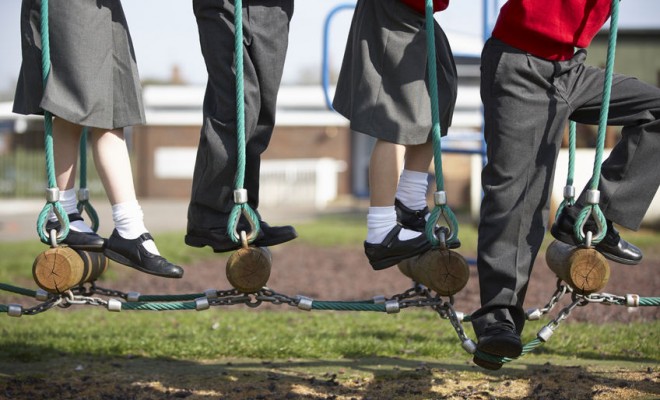
Childcare Environments
10 Ways to Support Children (and Parents) in Preparing for School
The transition from nursery to primary school is undeniably significant – even for children who are ready to embrace it – but there’s a lot that nursery workers can do to help make it easier. Here are our top 10 tips for how you can support children (and their parents) in preparing for school:
1. Work on basic numeracy and literacy skills
Children should be familiar with the alphabet and numbers 1 to 20 by the time they start school, and able to recognise their name when written down. You can help by doing activities that involve counting and letter recognition. Work on their fine motor skills so that they are comfortable holding and controlling a pen or pencil. Encouraging them to draw is an obvious way of doing this, but activities such as threading beads or shaping play dough are also beneficial.
2. Encourage independence
It’s important for children to be able to do certain things by themselves when they start school – partly for their own self-confidence and partly because the teaching staff won’t have time to assist. You can help children in preparing for school by encouraging them to remove and put on their own shoes and coats, feed themselves independently and tidy things away. And, of course, they should be able to deal with trips to the toilet by themselves – including washing their hands properly afterwards.
3. Foster concentration and communication skills
Although children still mainly learn through play in their reception year, they will be expected to be able to sit still and concentrate at certain times, for example during phonics sessions. They should also be able to follow instructions and communicate appropriately. If any of the children in your care struggle with these things, it might be helpful to set up a small group and work on these skills together.
4. Use books to prompt discussion
There are plenty of picture books about starting school, so make sure that your nursery is well stocked. Read the books with the children and use them to prompt discussion. How did the characters deal with starting school? Was there anything they were worried about? How did they feel at the end? If you suspect that a child is anxious about going to school but unwilling to take part in a group discussion, give them the opportunity to do this activity one-to-one.
5. Do some preparing for school role-play
Get the children to act out scenes from a typical day at school, for example putting their uniform on, saying goodbye to their parents, hanging up their coats, eating lunch, lining up to go into the playground. Use real props – pieces of uniform, book bags – if possible. Discuss any concerns that arise.
6. Identify groups of children going to the same school
It’s likely that some of the children at your nursery will be going to the same school(s). Find out which children will be in the same reception class, and subtly encourage them to play together; familiar faces can greatly ease the transition. But don’t force it – if they don’t get on then it could have the opposite effect. And take care not to upset children who won’t be going to the same school as their friends.
7. Make links with schools
Many nurseries develop links with their local primary schools and set up visits during the summer term. So a reception teacher might come to your nursery and meet the children who are joining their class in September, and/or a key worker might take their children for a visit to the school. As well as enabling the children to become familiar with the new settings/staff, these visits are also an opportunity to communicate any concerns about a particular child.
8. Communicate with parents
Tell parents what you’re doing to help prepare their children for school and how they can support this at home. Reassure them that the children will still be following the same EYFS curriculum (these links might help: https://www.gov.uk/early-years-foundation-stage and http://www.foundationyears.org.uk/2015/03/what-to-expect-when-a-parents-guide/).
9. Manage the process of leaving
While some children will skip out of the door on their last day at nursery and never look back, others will be very sad about leaving. Think about how you can make this easier. Maybe you could work on a scrapbook together, including photos of children and staff, for them to keep as a reminder of their nursery days.
10. Don’t overdo it
Although it’s important to support children with the transition from nursery to school, it’s also important not to overdo it. Too much focus on the subject of starting school may be counter-productive and result in children becoming either over-anxious or over-excited. Plan your activities carefully and spread them out. Use positive language when talking about preparing for school, but don’t go over the top. Remember that the aim is not only to allay fears but also to build realistic expectations.
References
EYFS Developmental Milestones – Download Free eBook








You must be logged in to post a comment Login